INTERVIEW: FIRE&DUST MEETS JEMIMA HUGHES
“You are destined to win this war…
because you are the only one in it.”
– excerpt from ‘Brother’ in Unorthodox
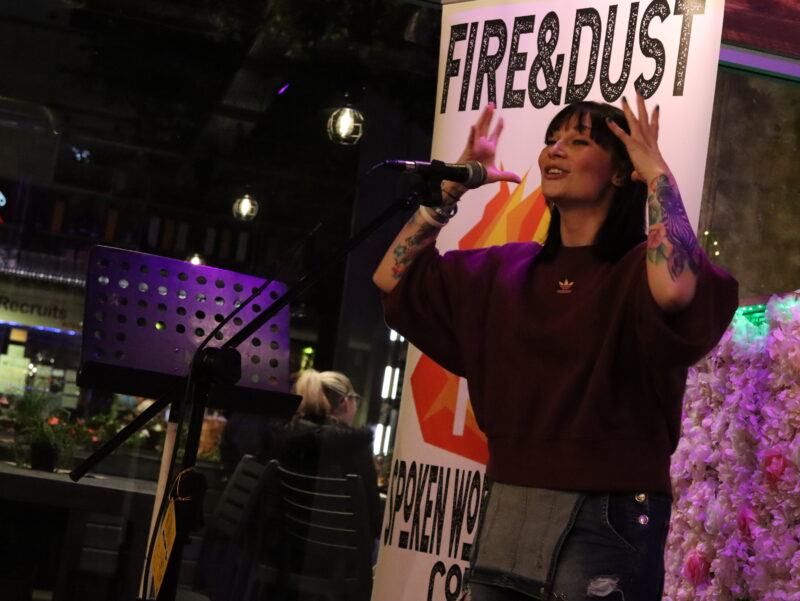
Photography credit: Tracy Morris
Jemima Hughes is a Birmingham-based performance poet and multi-slam winner who will drag you through the “mindfield” of the unorthodox. Her work emphasises mental health awareness and covers taboo subjects such as sexual violence, mental illness and suicide. She strives to takes readers and audiences on a journey through her own experiences, providing a relatable outlet and encouraging conversation. Always a gripping performance, Jemima’s poetry is not for the faint-hearted, but definitely from the heart. Her first collection Unorthodox was published with Verve Poetry Press in 2020.
On 1st September 2022, Jemima was the guest headliner at our Fire & Dust poetry night. Her compelling set stunned the audience, and we caught up with her after the event to ask a few questions…
HCE: Tell us a little about your background and journey as a writer so far. What inspired you to start creating and performing poetry?
JH: I started writing around 5 years ago when I began to have a mental breakdown. I’d suppressed a lot of emotion and trauma for 9 years since I was in an abusive situation when I was 16 years old, which involved sexual violence and attempted kidnapping. All the emotions built up on top of one another over the years and they overflowed. I started using poetry to express myself at a time when verbal communication was minimal, and I wasn’t leaving my room very much. Eventually, when I was feeling strong enough, I went to my first open mic night and shared a few short poems, and the performances just spiralled from there!
HCE: Who is your work aimed at – do you have an ideal audience in mind when you’re putting a poem together?
JH: I try to make my work understandable and accessible for a wide audience, however, with the raw and honest subject matters and the occasional swear words, it is aimed more towards adults. Or at least older teens and upwards.
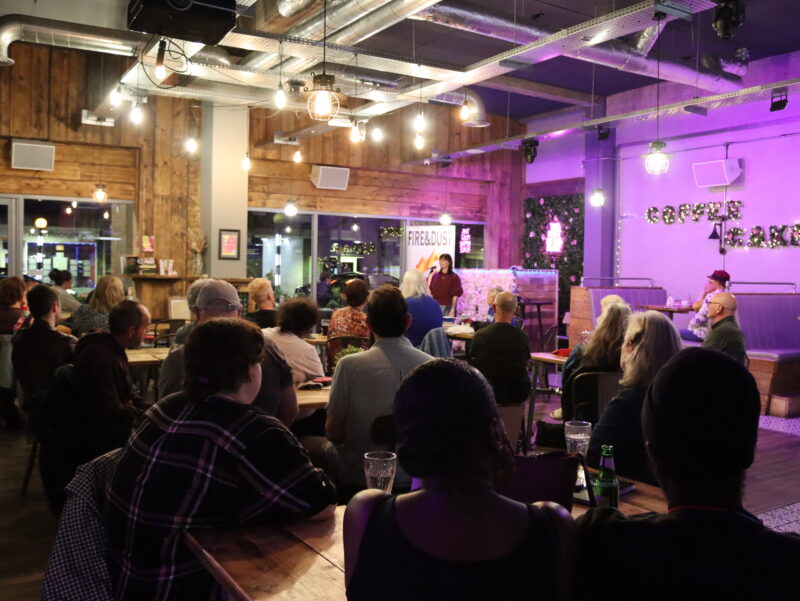
Photography credit: Tracy Morris
HCE: There are subjects and experiences you’ve returned to across your body of work so far, but are there also themes or motifs that you gravitate to?
JH: I always use lived experiences to write my poetry, I find I write more effectively this way. So, whether it’s about mental health, sexual violence or love and heartbreak, I like to express myself using first hand experiences to really emphasise the emotions that come with different situations.
HCE: Which of the poems in Unorthodox means the most to you, and why?
JH: Wow, I’ve never thought about this before! What a great question. Unorthodox is a collection which has my heart, and it’s hard to pick out just one poem because they tell a story as a collective. But to narrow it down, I’d have to say that there are a few pieces which are written specifically for people which mean a lot to me. ‘My Biggest Fear’ is a poem I wrote to my parents at a time when I needed to explain how I was struggling with my mental health but I didn’t know how to say it out loud. ‘Brother’ is a poem I wrote about my brother who had also struggled with his mental health and inspired me with how he’d come through them. ‘The Friend in the Green T-Shirt’ was a poem I wrote to my best friend who I wouldn’t be here without. So, these three poems are a little bit special, as are the people they’re about. I also have a place in my heart reserved for ‘Dear Brain’. I find, when I perform this piece, it’s the one which the most people relate to which means a lot to me.
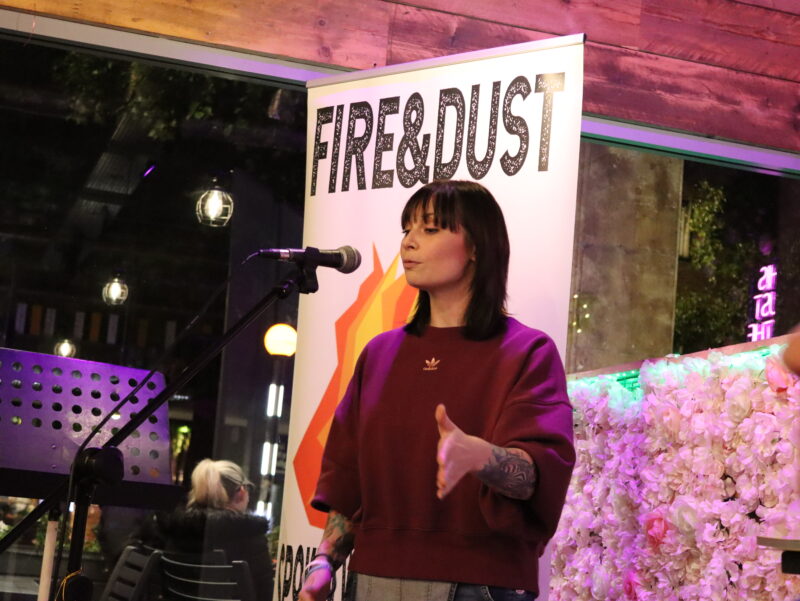
Photography credit: Tracy Morris
HCE: Your poetry explores your own life experiences and traumas in a raw and direct way. Is this an emotionally draining thing to do? What is the top piece of advice you would give other poets for tackling heavy/personal subjects in their writing and performance?
JH: It is extremely draining! I’ll be honest, when I first started writing, I would be out of action for days after writing one poem. And then when performing became something I was doing, it would take me up to a week to get myself back on my feet. This is because I’m having a therapy session every time I write or perform something about my life, it makes it all very real again. It was especially hard towards the beginning of my poetry career, because I had only just started to have actual therapy sessions, so I was still suppressing a lot of trauma. There was no doubt it was going to affect me as I began to let it out.
These days, I’m far less affected by writing and performing my poems. When I write new pieces or do a performance, I can carry on with the rest of life afterwards. I’d say this is down to the amount of therapy I’ve had over the past five years, and the amount I’ve already shared my story. Sharing my story has become quite a comfortable thing to do these days, and if it can help just one other person to continue theirs, it’ll be worth it.
HCE: The ‘My Morphine’ moments interspersed throughout your Unorthodox collection seem to function for readers like little drips of hope for recovery from trauma. Did these poems emerge as a connected group from the start, or were you inspired to make them a series during the process of putting the book together?
JH: ‘My Morphine’ started out as one long, ten-minute spoken word piece called ‘Unrequited Love’. It’s a piece I still perform often at gigs. When it came to writing the book, I felt like the subject was different in this piece to the rest of the collection, like it ran alongside the mental health story as a story of love and heartbreak and love again (but a different kind of love the second time around). So, I decided to weave it throughout the book rather than keep it as one, long stand-alone piece. The emotions expressed through ‘My Morphine’ are ones which impacted my mental health, both positively and negatively at different times.
It has many meanings behind it which I like to leave to the reader to interpret, because I find people interpret these pieces in the book differently depending on their own experiences of love, and I think that’s a beautiful thing. But what I will say for anyone who may read the book, is that these pieces link to my final poem on page 102.
HCE: What type of poetry do you seek out for personal enjoyment? As a reader/listener, when you engage with a poet’s work, what are you hoping to get out of it?
JH: I have a massive appreciation for the performance side of poetry, I think this is partly because I perform myself and partly because reading has never been my strong point. Conveying a message through performance is such a powerful way of changing the world! It really gets people thinking about their own views on things. This is particularly important when dealing with subjects that are still taboo like mental health and illness. Some really great performance poets to check out are:
Lorna Meehan – Actor, poet and solo theatre maker, with one-woman shows including ‘NO ENTRY’ which is a show all about her experiences with Vaginismus. It is so powerful and informative, and so important.
Leon Priestnall – I will never forget the first time I saw Leon perform live. His delivery is second to none. I read his book ‘Bennets Hill Blues’ before I saw him live, and it is a stunning collection. When I saw him perform the poems live for the first time, I was completely blown away, he performed them entirely differently to how I’d read them on page. I then went back and re-read the book with a whole different voice in my head. It was an experience I’ll never forget, and a poet I will never forget too. Unfortunately, we lost Leon in 2021. You can still get his collection from vervepoetrypress.com, it’s free and you just pay for postage. I recommend this collection to everyone.
James Scott-Howes – A huge inspiration to me on the performance side of things. His delivery is so powerful. I had the massive honour of collaborating with him recently on a piece we’re very proud of. This is someone to look out for, and for events to be booking! The messages he delivers are so important, speaking on men’s mental health issues and men’s responsibility to change the dynamic for women within society.
As much as performance steals my heart every time, there is occasionally page poetry which manages to captivate me and keep me reading. One to be mentioned is Emily Rose Galvin. Her collection ‘The Dew Point’ published with Verve Poetry Press in 2021 is unbelievable. It took my breath away. You can buy it here.
Overall, when I experience another’s poetry, I’m hoping to feel something I haven’t felt before. If the poet can make me think about something in a different way to before, or if they can explain something in a way I’d never thought of, I love that.
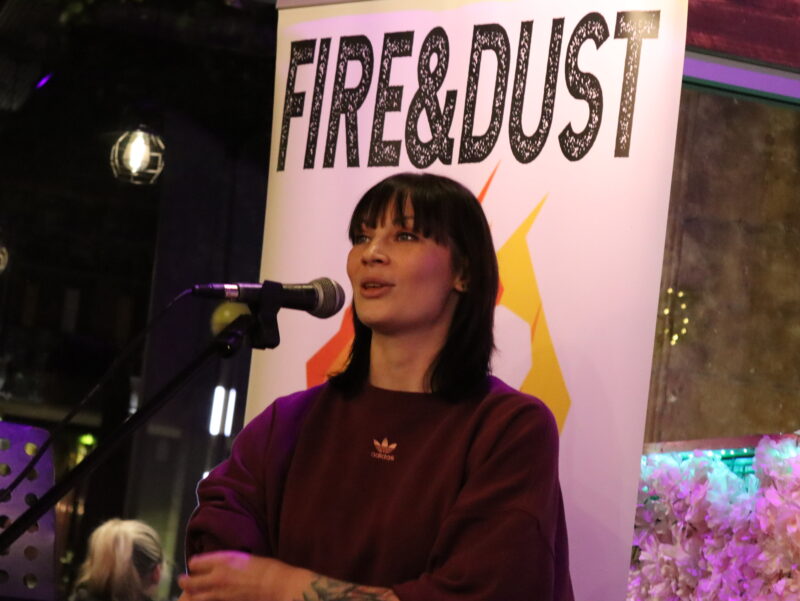
Photography credit: Tracy Morris
HCE: Who or what would you say are the biggest influences on your poetry?
JH: I think the biggest influence would be the events and the people in my life which inspire me (or force me haha!) to write poetry and vent my feelings.
As far as poetic influences, there are just so many, especially on the local poetry scenes. To name a few, as well as the people I mentioned in the previous question: Scott Cowley (The Rusty Goat), Nafeesa Hamid, Claire Tedstone, Giovanni ‘Spoz’ Esposito, Clive Oseman, Nick Lovell, Jasmine Gardosi, Casey Bailey, Sam Grudgings, Saili Katebe, The Revolt Poet. And so, so many more. I would be here all day trying to write down everyone who has influenced me on this journey.
I’ve drawn massive influence from the band Tank and the Bangas too. I was introduced to this spoken-word, jazz band 5 years ago. Their albums sit on repeat in my ears if I’m in need of some inspiration. Check them out! Their album ‘Think Tank’ is particularly poignant for me.
HCE: What’s next on the horizon for you? Are you already working on the next book/project/booked for upcoming performances?
JH: I’m currently working on the second collection to follow on from Unorthodox, which is super exciting! That will be coming out in 2023 and will bring a whole new set and tour dates. Until then, I’m performing as much as I can. I’ll be in Swindon at Baristocats on Oct 10th, then at Cherry Reds in Brum on Oct 16th. I’ve got some exciting projects in the works involving collaboration with other artists too!
If anyone would like to follow my work or would like to hear some mental health messages, you can find me on TikTok, Instagram and Facebook, all under jemima_unspoken. I also run a YouTube channel.
HCE: It’s a pretty amazing feat to have won multiple slams! Do you enjoy competing in slam events? Any top tips for open mic-ers planning to venture into the slam poetry scene?
JH: The slams I’ve taken part in have been a lot of fun! They’re always very friendly even when they’re competitive. Although, I do get extremely nervous! And I’ve been grateful for the break from those kind of nerves for a little while.
My top tip to anyone considering going into a slam is to find one where you know people. If you’re already open micing, there’s more than likely people organising or partaking in slams that you’ve already met on the poetry scene, so try out a slam with familiar faces first. It’s nice when it feels like just another poetry night rather than a competition. And remember, all judges are looking for something different. So, whilst you may not place at the top at one slam, you could very well be first at the next. You never know what to expect!
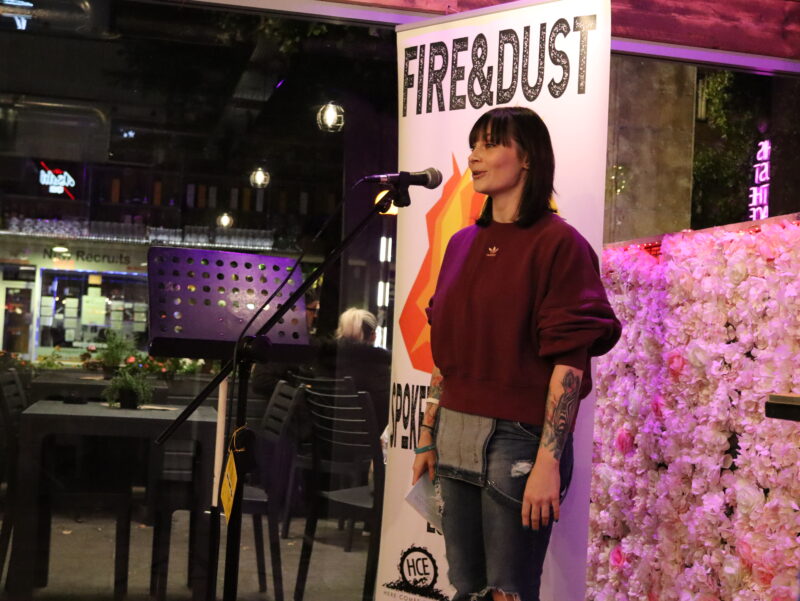
Photography credit: Tracy Morris
HCE: What’s the best way for people to keep connected with your work or contact you for bookings?
Website Instagram Facebook TikTok YouTube
HCE: Is there anything we didn’t cover that you’d like to share with our readers?
JH: I’d just like to finish by letting anyone know who may be reading this, that you are so important. Look after you. If you’re struggling with your mental health, please reach out to someone you trust. If you can, seek therapy. I know the waiting lists are fairly long, but I promise you, you are worth waiting for. Future-you is so proud of you for getting through this. Keep going.
I run a blog on my website, where people share their personal mental health experiences. It’s become a place where people can go to share their own experiences if they wish, or to read other’s experiences which may be relatable and supportive for them. Check it out if you fancy it!
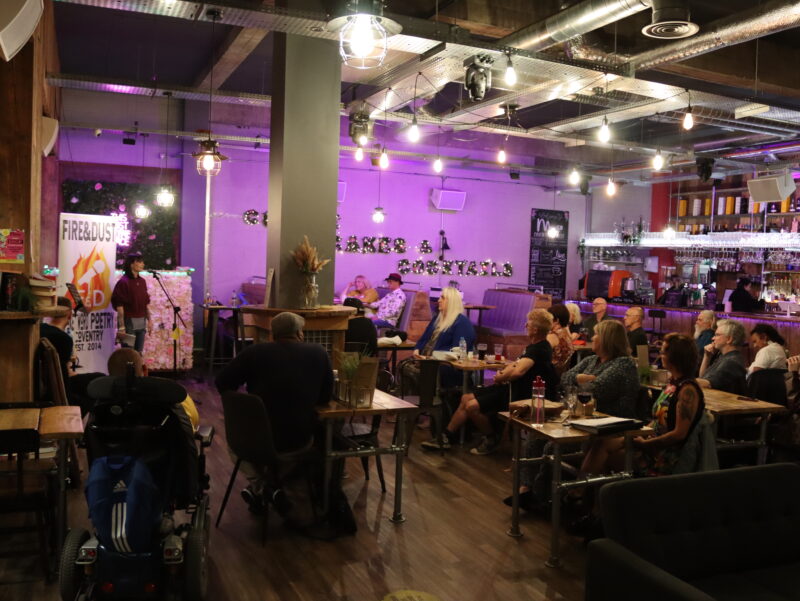
Photography credit: Tracy Morris
Jemima’s book Unorthodox can be purchased online direct from the publisher Verve Poetry. You can also contact Jemima via social media to enquire about a signed copy.
